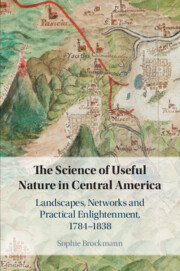 The Science of Useful Nature in Central America
The Science of Useful Nature in Central America Published online by Cambridge University Press: 27 August 2020
Chapter 6 demonstrates that projects for managing the natural world established in the colonial period enjoyed continued relevance after independence from Spain in 1821, as the new states of the federal republic of Central America embarked on renewed efforts to study nature. Focusing on the case study of Guatemala, the new republic maintained ‘useful patriotism’ as an ideal of citizenship and re-established colonial institutions such as the Economic Society. Even while undertaking self-consciously ‘modern’ mapping and surveying projects, statesmen drew heavily on the models of the late eighteenth and early nineteenth centuries. Moreover, despite the economic importance of Britain in Central America at this time, and despite the often negative opinions that British scientists and governments expressed of Spanish American (colonial and independent) knowledges, British investors and geographers were heavily reliant not just on the new maps of the independent state, but colonial geographical material from Spanish archives too. Colonial-era reform projects, often through a material legacy of plans in an archive, had laid the groundwork for imagining a Central America built on ideas of useful knowledge, patriotic dedication, and connected scientific networks around the world.
To save this book to your Kindle, first ensure [email protected] is added to your Approved Personal Document E-mail List under your Personal Document Settings on the Manage Your Content and Devices page of your Amazon account. Then enter the ‘name’ part of your Kindle email address below. Find out more about saving to your Kindle.
Note you can select to save to either the @free.kindle.com or @kindle.com variations. ‘@free.kindle.com’ emails are free but can only be saved to your device when it is connected to wi-fi. ‘@kindle.com’ emails can be delivered even when you are not connected to wi-fi, but note that service fees apply.
Find out more about the Kindle Personal Document Service.
To save content items to your account, please confirm that you agree to abide by our usage policies. If this is the first time you use this feature, you will be asked to authorise Cambridge Core to connect with your account. Find out more about saving content to Dropbox.
To save content items to your account, please confirm that you agree to abide by our usage policies. If this is the first time you use this feature, you will be asked to authorise Cambridge Core to connect with your account. Find out more about saving content to Google Drive.